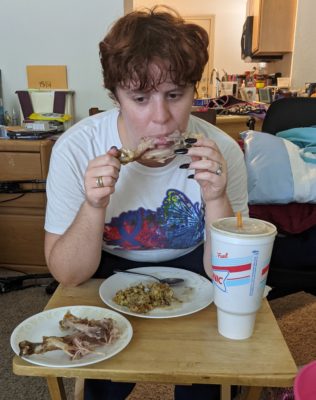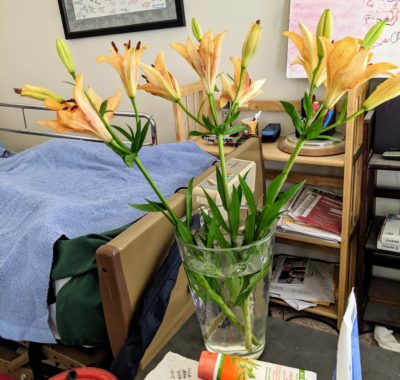This post describes, in part, the effects of a degenerative neurological condition called Huntington’s Disease. Any negative behavior on the part of my wife should be attributed to that condition. Any negative behavior on the part of myself should be attributed to my need for God’s ongoing grace.
If you would like to read our story from the beginning, you can start here: How We Got Here…
This week, in the U.S. at least, a holiday was celebrated (Thanksgiving) that had its foundation in the earliest years of our country’s formation, and was celebrated sporadically until it was formally defined by a Presidential proclamation in 1863. Although this event occurred during an exceedingly dark time in our nation’s history – our Civil War – President Abraham Lincoln declared the last Thursday in November to be a day of “Thanksgiving and Praise to our beneficent Father who dwelleth in the Heavens.” That much is history.
This year, Thanksgiving in the Porter household was a bit different. To begin with, Frannie and I can’t be out of the house at the same time now, so rather than going out to dinner, we decided to do Thanksgiving dinner here at home. I got a 12.68 lb turkey and fixed it with stuffing, mashed potatoes and gravy. Although the recipe specified 15 minutes per pound, the actual cooking time according to the all-knowing pop-up timer was slightly less that the 3 hours, 10 minutes and 12 seconds that the formula predicted.
In addition, Frannie and I ate on TV trays in the living room so we could be near to Janet – not exactly Norman Rockwell, but it got the job done.

As usual we did the “Five Kernels Of Corn” ritual, and while our mouths were still filled with the requisite thanksgiving and praise to God, this year some of the things for which we are giving thanks would probably seem a bit odd for those on the outside of our “community” who, looking in, might wonder what there is to be thankful for.
For instance, this year my first kernel of corn was, “I am thankful that Janet has started having bowel movements again, and is continuing to pass urine.” Strange, right? Not if you have ever cared for someone in the end stages of a terminal disease.
My second kernel of corn thanks God that things have worked out such that Janet can be in hospice here at home, protected from fearmongers that would isolate her from what little humanity she has left in order to “keep her safe.” Here at home, she has her husband and daughter to care for her, and while we might not be the most professional at times, we love her and care about her as a human being. Moreover, we recognize that the ultimate outcome is not in our hands. Although we might try to ignore the fact, this point is also true for all of us. Worry cannot add a single second to your life: all it does is steal your ability to live the life you have. There are no guarantees, and (with the possible exception of one or two) everyone ever born has died.
The third kernel of corn reminds me to be thankful that Janet is not surrounded by medical instruments and monitors to catalog every beat of her heart and measure every breath she takes. I did that once with my son Larry, who died when he was three days old. Those three days were beyond indescribable because, among other things, it turned his tormented little blue body into a machine that they had to keep going for one more hour, one more minute, one more second.
Kernel number four is for my daughter Frannie. She has been, and is continuing to be, amazing. She is daily dealing with things that women her age should not have to be concerned with. Together we have learned how to tag-team Janet’s care and how to work together to do such things as change the linens on a bed while it is still occupied.
The fifth, and last, kernel is for me a thankful reminder – and reassurance – that the words put down by the founders of our nation are most certainly true, that we, “ … are endowed by our Creator with certain inalienable rights … ” – a truth, by the way, which they did not create. It was another truth that they discovered, not unlike the truth of gravity or the truth of a (roughly) spherical world.
However, this bold statement changed the world, because it made clear the fact that human rights are not given by governments and rulers, but that they come from God. Secondly, the document as a whole proclaimed that that wasn’t true just for the citizens of thirteen British colonies in North America, but rather, this truth is fundamental and applies to all people regardless of who they are or even when and where they live. This point, in turn, should give rulers pause when they try to either take credit for, or abridge the rights of a people. Though it rarely does. I wonder what was the last thing to go through the minds of Benito Mussolini or Nicolae Ceausescu – I mean besides the bullets.
Therefore, while there might be much to be aware of, there is also much to be thankful for even in the hardest of situations. Yes, it is true that Janet’s health is failing day by day. But it is also true that when her end comes (whenever and however it might occur) she will not simply meld into some impersonal cosmic consciousness, evaporate into nothingness, or be patted on the head and told to go back and try again.
When she leaves here she will be going on to another somewhere, where she will meet the Someone who created her. Then, free of the Huntington’s Disease, she will be reunited with those who have loved her and gone before, “ … back a thousand generations, to the beginning of the worlds.”
In Christ, Amen ☩
❦ ❦ ❦ ❦ ❦ ❦
A prayer for when you are feeling less than thankful…
“Blessed are You, Lord God, King of the Universe. It is right that I should at all times and in all circumstances bless You for all the manifest gifts that You bestow upon the world that You created. But today I want to bless You especially for the gifts that we remember on Thanksgiving. Please give me a perspective that allows me to see the blessing in all that You bring into my life. Then show me how to share those blessings and truths so as to enlighten the hearts and souls of my fellow travelers. Amen.”



